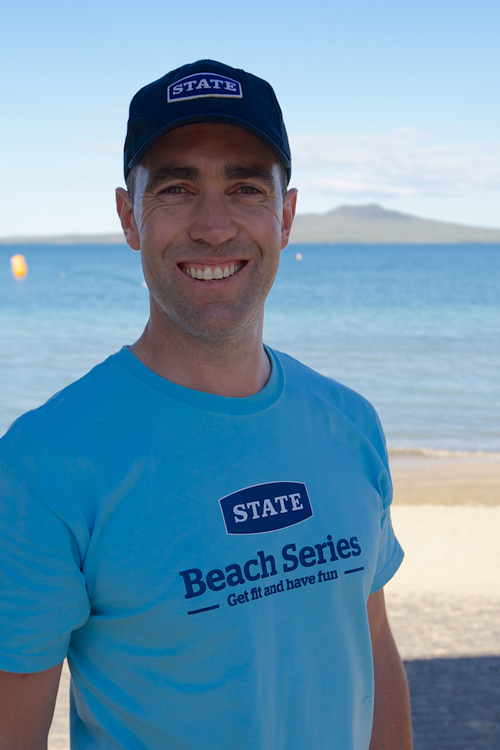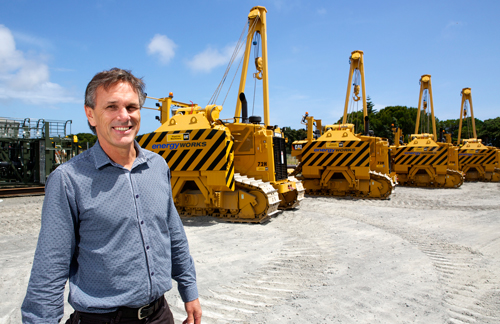Well connected
Stephen Dil owns a modern day, third generation family-owned, community-focused funeral business where nothing is ever too much trouble.
Forget the stereotypical, sombre face of funeral directors epitomised during the age of Charles Dickens. Nowadays, your local funeral director is arguably the most approachable and obliging person you could ever hope to meet. Stephen Dil is one such example.
Stephen is managing director of Dil’s Funeral Services on Auckland’s North Shore.
The third generation family business owns an impressive chapel complex in Albany, just a stone’s throw from the crematorium, and has a staff of up to 25.
Stephen’s grandfather, Wilfred Dil, started the business in 1960 – converting part of his home in Birkenhead’s Hinemoa Street into a chapel. The business has remained in the family ever since.
Stephen’s father, Lindsay, joined in the 70s and still works in the business part-time today – while Stephen began his apprenticeship in the mid-90s after high-school.
“Family businesses have the effect of sucking you in,” he says, “for me it just seemed like the natural thing to do.”
His turn to own the business came in 2005, just over a decade after the business built, and moved to, its Albany premises. Stephen says the real catalyst for growth came in the 80s with the general move away from traditional church-based funeral services to celebrant-conducted services, and the [more recent] preference for one-stop service providers to take care of all aspects of a funeral.
After completing nine years of undergraduate study for a Bachelor of Business Studies (majoring in Management) at Massey in 2008, while still working full-time, Stephen then took his wife Heidi and three daughters off to the US in 2011 to allow him to continue his education. Through a two-year scholarship he completed an MBA at Penn State College.
Stephen had structured his business in such a way that it could successfully carry on in his absence.
The whole MBA experience led him to conclude that he was running a well organised and structured business; innovative, with a positive staff culture and well respected in the community.
Perhaps the greatest outcome from his two years in the States was the increased sense of self-confidence he brought back. “Confidence in my abilities to make decisions and move the business forward.”
Greater self-confidence translates into being perceived differently by others, he adds. For example, he knows his ability to negotiate with his bank manager stepped up a notch. “Just understanding the lingo helps you to cut through the red tape,” he says.
The modern day funeral director
Stephen says the lingering perception of a funeral director being an inflexible, old-fashioned, somewhat gloomy individual – someone who would dictate how the funeral will be conducted – is perhaps his biggest frustration. It’s hard to believe that people still have this perception in 2015, he says.
“Of course, when we work with families they quickly realise that we’re just normal people here to help. We have their interests at heart.”
Stephen says his job is to listen to what people want; to learn what’s important to them; to make the whole process as stress-free as possible. Helping people to cope with their feelings of grief, to deal with the logistics of a funeral – that’s where their service excels, he believes.
Dil’s chapel caters for all faiths and cultures. Nothing, it would seem, is too much trouble when it comes to successfully capturing the essence of the person whose life is being celebrated.
Another means of shaking off the aforementioned stereotypical image is through modern, airy, state-of-the-art premises, bristling with all the very latest technology. In Dil’s case that technology includes live-streaming services via three cameras, the ability to post tribute pages online, and a full-time graphic designer to take personalised service sheets to a new level. (Stephen reminds me that his grandfather was a bit of a pioneer in the service sheet department – being one of the first to include photos via his trusty Gestetner printing machine.)
First impressions count when selecting a funeral director too – which is one of the reasons why Stephen allocates a healthy chunk of his annual budget on building maintenance and improvements.
And while we’re on perceptions, another one Stephen, and other funeral directors, contends with centres around the cost of funerals. He says that while the all-up cost may seem high to come people, it’s important to remember that up to two-thirds of that cost goes to other service providers – primarily the local Council for burial and cremation fees.
In what is essentially a static, and highly competitive, market, business growth all comes down to efficiencies. One solution to the cost factor, Stephen believes, is encouraging more people to pre-pay for their funeral expenses. Then there’re no surprises. He says currently only around five percent of funerals in New Zealand are pre-paid.
“At the very least, people should talk about what they want – have a plan so there’s no uncertainty about what will happen.”
Community connection
Having a strong presence in the community is another way Dil’s Funeral Services is breaking the funeral director stereotype. Through various sponsorship activities, such as Guide Dogs and the Youth Development Trust, Stephen’s aim is to “help local people to live better lives”. He has also put his own impressive basketball experience to good use by coaching his 11 year old daughter’s basketball team.
“It’s about not being a stranger in the community – making that real connection,” he says.
Of course, life as a funeral director puts you in close contact with the community. It also comes with its unique challenges. The 24/7 nature of the funeral business means managing on-call staff can be tricky. The hours are long – when there’s a death people expect an immediate response. Stephen remembers fielding five phone calls one particular Easter Saturday, each caller wanting to discuss a funeral service.
Dil’s will always be a demanding business and Stephen wouldn’t have it any other way.
In an industry that’s undergone a good deal of corporatisation over the past 20 years (“where the focus is on satisfying overseas shareholders”) he knows a third generation family owned funeral service business is fast becoming a rarity.
So will any of his daughters take up the reins to usher in a new generation of ownership?
“That’s entirely up to them to make that decision,” says Stephen. “Fortunately, the time for that is still a fair way down the track.”



